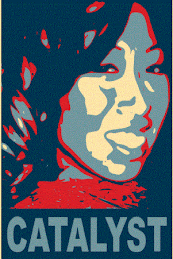My Internship at the California State Capitol
“The only way to know the future is to invent it yourself.”
Ernest J. Wilson, III
Walter Annenberg Chair in Communication
Dean of the Annenberg School for Communication
University of Southern California
As a Communication studies major with a concentration in public relations and a minor in marketing (1) the past two months during my internship, many mentors have given me a very clear picture as to what it takes to handle a high profile communications career.
When I chose to return to college after a seven-year “break”, I envisioned myself taking basic courses to fulfill graduation requirements as quickly as possible. Having experienced such a privilege, my attitude towards school has shifted. Rather than reluctantly attending classes, I luxuriate in my educational journey at Sacramento State.
Working in Lieutenant Governor John Garamendi’s office during his campaign for United States Congress has been hectic, but very rewarding. There is no other way to understand the value of transparency in communication, ethics in political communication, intercultural relations, group dynamics, or public relations with high profile individuals like working at the California State Capitol (2).
From my very first day in the Lieutenant Governor’s office, I was treated as someone who had already made a difference. I was entrusted with researching ways to honor the Tuskegee Airmen, crafting the words that would commend the Asian Pacific Public Affairs Association, and assisting constituents in finding the right elected official to contact to resolve various issues.
During the campaign, it was the mission of the staff to compile archival materials. Most of the time, we reformatted documents and gathered any significant memorabilia. To others this would seem tedious and mundane, but for me I got to know what kind of legislator John Garamendi truly is (3).
As a past Peace Corps volunteer, insurance commissioner, a legislator with over 30 years of experience and a grandfather of nine, he has made it a mission to serve. With his wife by his side, the two of them have championed causes to protect the environment and higher education in California.
The very best part of this internship was assisting Ms. Mona Pasquil in her keynote address of the Public Relations Student Society of America (PRSSA) National Conference in San Diego. I had the pleasure of being present as Ms. Pasquil gave her first public appearance as the acting Lieutenant Governor. It was such a blessing to get to know her story; she shared about who she was, where she came from, and how she got to be the second person in command of California (4).
Ms. Pasquil was the eldest of five children, born to parents of Filipino immigrants.She was an English literature buff and had no clue that her love of Chaucer would end up in a career in politics! Ms. Pasquil also shared about her experiences working with the Clinton campaign. The room was filled with awe for her tenacity to stand up to ethical dilemmas, in the face of the highest profile situations.
At the PRSSA Conference, there were several break-out sessions featuring public relations professionals speaking on various topics. The most common themes in all of these sessions were three topics: media technology, ethics, and globalization.
In terms of media technology, the older speakers almost all admitted that the younger generation has an advantage in terms of Internet familiarity. A speaker joked, “I have an accent when I speak digital. You young folks can speak fluently—without an accent.”
The most senior public relations professionals were flattered when I asked them how they handled ethical dilemmas. Naturally, different people gave different responses. One said that there is always a “happy medium”; one can always find win-win situation. Another advised us to always “stand your ground”.
My professor John Williams discussed ethics in the Introduction to Public Relations class (COMS 118), and implored that we take a “moral” inventory before entering the profession (5).
After learning more about the public relations profession, I was glad to have explored my morals and ethics already. In terms of globalization, one speaker enumerated the benefits of being multilingual and having a global perspective of the media. There are two options: immerse yourself in a language (and culture) that is in demand and guarantee that there will be a demand for your services or immerse yourself in a language (and culture) that is exotic and commonly unknown and guarantee that there won’t be much competition.
Luckily for me, the Intercultural Communication class (COMS 116) made it clear to me that relating to the public requires an understanding of various cultures. What could be offensive to one group could be a blessing to another (6).
I would absolutely recommend this internship to other students (9). Any opportunity to learn more about what power citizens have in the government is valuable for anyone. Just learning that writing a letter or making a phone call can greatly improve an issue that one may have thought to be futile has already enriched my experience of being American.
Unfortunately, it would be impossible for every student to have the experiences I had. It is the nature of internships that everyone has a unique experience. There was no syllabus that clearly forewarned that I would be a part of a winning congressional campaign, or that my mentor would become the highest female official in California during my internship. During the celebration farewell for the newly sworn-in Congressman Garamendi, the staffers and interns were presented with official proclamations for our service.
It would have been a treat to have met with the others interning in our department to share experiences (8). Perhaps in the future, there could be a way for the students enrolled in communications studies internships to share experiences. Even if this opportunity to communicate were online (i.e.: via Facebook group or Twitter), I think it would have a positive effect on the program itself.
After graduating in December 2010, I would like to attend graduate school at the Annenberg School of Communication at the University of Southern California in 2011. (Hopefully with my stellar grades at Sacramento State and letter of recommendation from the former Lieutenant Governor John Garamendi, I will be accepted).
In November, my trip to Southern California also allowed me an opportunity to attend a graduate school orientation for Annenberg’s Strategic Public Relations program. Among 300 attendees, I was in awe of the forward-thinkers at the helm. From the moment the dean spoke, I knew that Annenberg’s graduate program was for trailblazers and groundbreakers of media.
Annenberg’s Dean Ernest J. Wilson, III spoke of convergence in media in a way that I hadn’t heard before. He challenged each prospective student to take the future in our own hands, rather than approach graduate school as an educational vacuum. Dean Wilson also made it clear that Annenberg’s graduate programs are for “doers”, rather than “thinkers”. And as a result, I am inspired to blaze a trail of my own (10).
My goal is to take the skill, forward-thinking tenacity, (and not to mention the connections) that a USC Annenberg graduate degree has to offer and launch my own boutique public relations firm. With the autonomy of my own firm, I may take on corporate as well as nonprofit clients. I have always been interested in the entertainment industry. With a boutique firm, I would like to focus on bridging entertainment and charitable causes by creating opportunities for cross marketing.
In addition, it is a new dream of mine to become an adjunct professor in a college of public relations. Teaching is said to be the best way to learn, as well as a great way to scout for talent.
It is no coincidence that I have been inspired by my journalism and public relations professors this year. Both Professors Timothy Howard and Michael Fitzgerald have made writing skills a priority (11). Both Writing for Public Information (COMS 123) and News Writing (JOUR 30) focused on writing with accuracy, brevity, and clarity. Professor Fitzgerald’s News Writing course taught me the valuable lesson of understanding the way journalists think. The relationship between journalists and public relations professionals doesn’t need to be adversarial, by any means.
Both professors also encouraged me to go beyond the classroom to learn. Professor Howard’s persistent invitation to the PRSSA Conference in San Diego paid off; attending the conference allowed me to take an in-depth look at public relations as a profession and realize that it is my passion. Professors Howard and Fitzgerald applauded my involvement with the State Capitol and reassured me that my enthusiasm would open doors. This semester has blessed me with many mentors.
___________________________________________________________
Notes
Answers questions: What’s your major/concentration? In what ways did this internship relate
directly to your major and/or concentration?
Elaborates on the value of this internship as an educational experience
Answers question: What were the most important things you learned?
Answers question: What were the most important things you learned?
Answers questions: How has your coursework in the Department prepared you for this
internship experience?
Answers question: What courses were particularly useful and why?
Answers question: Would you recommend this internship to other students? Why or why not?
Answers question: How could this internship be improved for students in future semesters?
Answers question: How does your internship fit in your plans?
Elaborates on career plans and goals
Answers questions: How successful do you feel your academic program was helping you
develop the oral and written communication skills and reasoning skills you needed for this
internship?
 4. The role of Na'vi females is just as strong as the males: the Chief's partner and spiritual leader is his wife; they are of equal status in their tribal leadership.
4. The role of Na'vi females is just as strong as the males: the Chief's partner and spiritual leader is his wife; they are of equal status in their tribal leadership.
